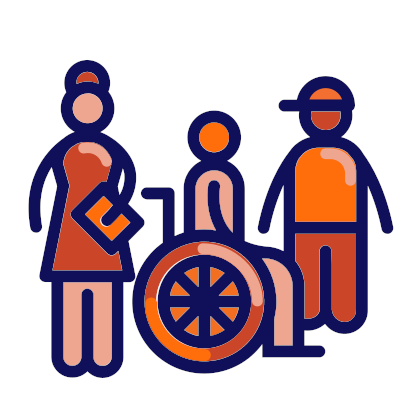Tackling discrimination

Schools can tackle discrimination by promoting democracy, respect for human rights and citizenship.
To ensure that all students’ needs are met equally, schools need to prioritise language and cultural competences, multiperspectivity in history and gender equality. In this way, students can acquire competences for democratic culture, to fulfil their potential in school as well as in society.
Facts & figures
Students with disabilities in Europe have higher early-school leaving-rates than their same-age peers.[1]
Black Caribbean students are three times more likely to be excluded from English schools than white pupils. [2]
A survey of nine EU countries showed that 33% of Roma students were in schools where most pupils were Roma, with 13% in Roma-only schools.[3]
What is discrimination?
Discrimination is treating a person badly or unfairly on account of a personal characteristic, such as national, ethnic or social origin, gender, language, religion, disability or sexual orientation.
There are two basic forms of discrimination:
- Direct discrimination – treating someone less favourably than you treat or would treat another person in the same situation, e.g., a school refusing to admit a student because they are Roma,
- Indirect discrimination – applying a provision, criterion or practice in the same way for all of a group which has the effect of unfairly disadvantaging people in the group who share a particular characteristic, e.g., a school uniform policy banning headgears for girls and boys may unfairly disadvantage Muslim girls and Jewish boys.
Discrimination can occur in almost any aspect of school life, from the attitudes and expectations of teachers to school rules and codes of conduct, selection and grouping practices, curricula, teaching methods and materials, changing facilities, career guidance, canteen food and the physical school environment.
Whatever form it takes – whether it be parallel school systems for different ethnic groups, concentrations of minority or disadvantaged children in the same school, or differential access to educational provision, it means a lower quality of educational experience for the students being discriminated against.
Why is tackling discrimination important at school?
Discrimination is a human rights violation. Article 14 of the European Convention on Human Rights contains a prohibition on discrimination with respect to any of the rights and freedoms guaranteed under the Convention. Article 2 of Protocol No.1 requires the state to ensure that all individuals have access to its formal educational provision.
“No person shall be denied the right to education.”[4]
“The enjoyment of the rights and freedoms set forth in this Convention shall be secured without discrimination on any ground such as sex, race, colour, language, religion, political or other opinion, national or social origin, association with a national minority, property, birth or other status.”[5]
Tackling discrimination is not simply a duty laid on schools by the European Convention of Human Rights, it is also important for student well-being and educational success. Children and young people who are treated unfairly or discriminated against are more likely to have:
- negative attitudes to school
- lower levels of motivation and academic achievement
- a higher risk of dropping out of formal education
- experience of bullying
- mental health problems.
Feeling different or ‘less’ than others can be an isolating experience. Over time it undermines an individual’s capacity for participation in society, e.g., their sense of self-efficacy, openness to other cultures and beliefs, tolerance of ambiguity and flexibility and adaptability - all of which lie at the heart of the Council of Europe Reference Framework of Competences for Democratic Culture.
Lack of opportunity due to discrimination in school also damages society. It intensifies social divisions, fuels xenophobia and intolerance and undermines social cohesion.
“States should adopt a combination of strong anti-discrimination measures and policies that promote more inclusive education systems where all children learn together. This is not a utopian project, but an achievable goal that can ensure more equal treatment of all children and, in the long term, improve social cohesion”[6]
What are the challenges?
One of the challenges facing the tackling of discrimination in schools is a lack of data. European-wide statistics specifically focused on discrimination in schools are scarce. Children with disabilities, for example, do not always appear in national statistics and may be ‘invisible’ to decision-makers, service providers and the public. Such children are particularly vulnerable to discrimination, however, and are often segregated in terms of educational provision.
These are not the only ‘invisible’ minorities in schools. For example, LGBTI students often feel they have to hide their sexual orientation at school to avoid victimisation.
Another key challenge is the existence of negative stereotypes about minority groups among teachers, parents, students and other school stakeholders. Such stereotypes are often deeply embedded in everyday school life and practice, so much so that they are taken as ‘normal’, e.g., stories and images in textbooks that reflect a stereotyped portrayal of the roles of women and men, girls and boys. Stereotypes help to fuel prejudiced and aggressive behaviour between students, lower expectations from teachers and negative attitudes from parents, e.g., refusing to allow their children to be taught alongside refugee or migrant children.
Stereotyping is difficult to root out in schools because its origins lie in wider society. This is exacerbated by the current preponderance of hate speech, fake news and conspiracy theories in digital media, especially social media.
The situation is compounded when minority groups are under-represented on school staff. Students lack role - models and teachers do not have the access to information about or insights into other cultures and ways of life that come with belonging to a more diverse profession. They lack the intercultural competences with which to create inclusive and quality learning environments, e.g., openness to cultural otherness, tolerance of ambiguity, plurilingual skills and knowledge and critical understanding of alternative cultures, religions and histories.
Tackling discrimination is more challenging when there is a lack of dialogue between schools and parents. Often this is on account of language difficulties, but it is also a problem where students’ parents work abroad leaving their children in the charge of elderly relatives or others.
How can schools get active?
Ensuring all learners of any age are provided with meaningful, high-quality educational opportunities alongside their peers requires a whole-school approach.
It begins by schools understanding who might be at risk of discrimination, what they can do to minimise discrimination and how they can support students at risk of discrimination. A good place to start is with an assessment of the current situation, identifying the strengths that exist in the school, but also needs and priorities. Consulting with school stakeholders is essential, especially students and, where possible, parents – e.g., using surveys, questionnaires, focus groups, etc. Given the sensitivities involved there is argument for collecting information on individuals’ experiences of discrimination anonymously.
Based on an assessment of the current situation it is possible to identify immediate priorities for policy development. Priorities will vary with the school, but might include, for example:
- language development
- gender equality
- accessibility of the physical environment
- intercultural competences.
The setting of initial priorities should go hand in hand with professional development for senior leadership teams as well as teaching staff. An element of personal as well as professional reflection is essential to the tackling of discrimination in school. In particular, it is important for school staff to be able to consider their own beliefs and values with regard to discrimination, including their own unconscious biases and prejudices.
Schools can then turn to the longer-term aspiration of creating a culture of non-discrimination. Central to this process is the challenging of negative stereotyping, both in classrooms and around the school. This can be done in a variety of ways, including:
- challenging stereotypes when they are heard
- discussing stereotypes with students
- identifying stereotypes in the curriculum
- highlighting stereotypical images and roles in textbooks
- allocating posts of responsibility equitably
- choosing different ways of dividing up students
- providing a range of role-models
- setting up mechanisms for monitoring incidents of discrimination.
Challenging stereotypes goes alongside the promotion of inclusion and an appreciation of the benefits of diversity in school life. This can take different forms, including:
- using inclusive language
- including human rights, democratic citizenship and intercultural education in the curriculum
- encouraging the discussion of controversial issues
- promoting student voice
- involving students in peer education and peer mediation activities
- welcoming parents and involving them in school decision-making
- forming partnerships with different organisations and groups in the community.
[1] Education section of the The European Disability Forum
[2] Article: UK: Racial discrimination is a reality in schools and classrooms. Education International
[3] EU Fundamental Rights Agency, “Second European Union Minorities and Discrimination Survey (EU-MIDIS II) Roma – Selected findings” (2017).
[4] ECHR, Article 2, Protocol No.1
[6] Position paper: Fighting school segregation in Europe through inclusive education by the Council of Europe Commissioner for Human Rights
 Resources on Tackling discrimination
Resources on Tackling discrimination
 Related schools projects
Related schools projects
Address: Annikanpolku 9, 20610 Turku
Country: Finland
Project: Dealing with controversial issues
 Working language during the project:
Working language during the project:
- Finnish and English
 Themes of the Council of Europe campaign “FREE to SPEAK, SAFE to LEARN - Democratic Schools for All” covered:
Themes of the Council of Europe campaign “FREE to SPEAK, SAFE to LEARN - Democratic Schools for All” covered:
- Addressing controversial issues
- Preventing violence and bullying
- Tackling discrimination
 Competences from the Reference Framework of Competences for Democratic Culture (CDC) addressed and where / how they were integrated:
Competences from the Reference Framework of Competences for Democratic Culture (CDC) addressed and where / how they were integrated:
- Openness to cultural otherness and to other beliefs, world views and practices
Turku University Τeacher Training School is a multicultural school, situated in an area with a large number of immigrants (Varissuo): more than 65% of our pupils have Finnish as their second language. Pupils have approximately 50 different home languages and various cultural, religious and ethnic backgrounds. Equality, human rights, language awareness in education, intercultural skills and cooperation skills are at the core of our education. We also educate teachers to be part of a section of Turku University Faculty of Pedagogics.
We have developed regular practices to develop a learning environment that would foster and promote these core skills.
First of all, we have an annual Controversial Issues theme day organised by our teachers and students. Classes work in workshops on topics which include: different cultural practices, beliefs and values. The following are examples from last April’s workshop: Science vs. God / Sexual minorities / linguistic rights / Animal rights / Expression of feelings / Identity / Human rights / etc. Themes are suggested by pupils, and student teachers take up the themes that best match our curriculum. All 130 student teachers became familiar with methods of handling controversial issues in classrooms in several afternoon sessions. Special focus in workshops and in trainings fell on listening, discussion and dialogue skills – and this year our school community’s main theme is dialogue.
Among 8th-graders we organise workshops against racist attitudes regularly.
Teachers cooperate on lessons about various religions and other subjects (Islam, Lutheranism, ethics) in order to maintain and foster peaceful discussion of controversial issues.
Our policy is also language awareness, which includes lessons in pupil’s home languages. By authorising and even encouraging pupils to use their home language for learning we try to promote an atmosphere favourable for learning and various identities. All teachers have been trained to use methods and means of learning that help pupils of different backgrounds and sometimes with only basic language skills to feel included in the learning process and not separated from the school community. We do not have separate groups for language beginners.
- Valuing democracy, justice, fairness, equality and the rule of law
Classes suggest workshop topics that are important to them; topics are handled in versatile methods according to the class needs; all voices are heard in workshops; linguistic, sexual, ethnic, religious and other minority issues are a focus of topics.
We co-operate actively in our neighbourhood community: guardians, authorities and ethnic organisations. We deal with any conflicts together with guardians and with other local authorities, e.g. youth workers and local police. The attitude is to tackle any problem at once before it becomes an issue and to create a supportive network for our pupils – we all work with same children. For example, we organise weekly youth house breaks for different groups (girls, 7th graders, and 8th and 9th graders), and pupils can influence which games or other activities can be undertaken in the youth house, which is located just next to our school.
We invest in good relations with guardians: we have regular multicultural and multilanguage parents’ evenings in our school, and our teachers from, for example, Somalia, Kosovo and Kurdistan are present in lessons and meetings with guardians. This has enabled us to build mutual trust so that girls, for example, are trusted to participate in school events without questioning.
- Knowledge and critical understanding of the world: politics, law, human rights, culture, cultures, religions, history, media, economies, environment, sustainability
In our curriculum there are official plans against bullying, violence and for equality. The equality plan is checked regularly by a survey carried out by pupils. Media criticism and skills are crucial for critical thinking skills and they are used in workshops and in lessons throughout all subjects. It is highly recommended that Friday morning sessions in the classrooms are dedicated to world news and critical discussion of world news. At the current moment, we are in the middle of media criticism week.
There is an active student council in our school both at the primary level and for grades 7-9. The student council organises, for example, activities in environment protection, on Unicef, interview sessions of principals. The student council takes part in recruitment e.g. new special education teachers. And they asked very good questions!
 Target group age range:
Target group age range:
- 11 - 15
 Level of education:
Level of education:
- Lower secondary education
Short description of the project:
We arranged an annual theme day for controversial issues for lower secondary pupils. Topics are suggested by pupils, who also work in their class groups during the day. We made a washing line – an exercise for choosing the workshop topics: Pupils write (anonymously) three notes and hang them on a washing line: one note for a “cold” topic (a controversial topic that is perfectly all right to talk about in the school community), one note for a “lukewarm” topic (a controversial topic that might be a bit difficult to talk about in the school community) and one note for a “hot”” topic (a controversial topic that is very difficult to talk about in the school community). By this exercise we hope to give an opportunity to students to express themselves on those topics which are difficult to discuss in pupils own cultural environments. Thus, we get many topics that are important to pupils. Our student teachers choose one topic for each group and prepare a theme day for each group about this topic. Each group has to handle the topic from at least two different angles or subjects. Examples of last years’ topics are: human rights, sexual minorities, gender equality, animal rights and zoos, expression of feelings among others. Our national curriculum wants the topics to be relevant and important to pupils in multidisciplinary learning modules.
The theme day consists of learning facts and information, discussions, expression of feelings and attitudes and listening to others. Most of the methods are active, involving pupils, e.g. drama. The activities are planned by student teachers, with a supervisory teacher for giving guidance. The teachers and student teachers are familiar with methods for dealing with controversial issues. Teachers are especially trained to guide the learning process for student teachers and pupils. A special focus is placed on teaching listening skills.
The experiences from last April were encouraging. The atmosphere was calm and relaxed; no quarrels or difficult situations emerged. A survey among teachers showed that the theme day is worth organizing annually, so we will continue with it next April, with minor improvements.
 Aims/objectives
Aims/objectives
- Give a channel to express different values, opinions and attitudes;
- Learn to listen to others and accept that there are different ways of seeing the world;
- Learn about human rights and equality;
- Teach our teacher Students to deal with controversial issues in a multicultural community.
 Expected results/outcomes
Expected results/outcomes
An annual theme day of controversial issues in April
 Changes
Changes
- In the school community: less violence, arguments and discrimination based on ethnic, racial, sexual, religious differences;
- Among teachers and student teachers: more self-confidence and stronger democracy in classes when dealing with controversial issues.
 Challenges you faced
Challenges you faced
Multicultural school environment with pupils from 50 different language areas.
 Time-frame of the project:
Time-frame of the project:
Training teachers in January 2020, Training student teachers in spring 2020, annual theme day in April (we already did this last year).
 Council of Europe materials on citizenship and human rights education used while preparing or implementing your practice:
Council of Europe materials on citizenship and human rights education used while preparing or implementing your practice:
- Managing controversy
- Teaching controversial issues-training pack







